The Future of Marketing Automation: How AI is Transforming Customer Engagement
In today's fast-paced digital landscape, marketers are constantly seeking innovative ways to connect with their target audiences and drive meaningful engagement. One of the most promising advancements in this endeavor is the integration of artificial intelligence (AI) into marketing automation strategies. From personalized messaging to predictive analytics, AI-powered tools are revolutionizing the way brands interact with consumers and optimize their marketing efforts for success.
Understanding AI-Powered Marketing Automation
Marketing automation has long been hailed as a game-changer for streamlining repetitive tasks and nurturing leads through the sales funnel. However, the introduction of AI has taken automation to a whole new level of sophistication. AI algorithms can analyze vast amounts of data in real-time, enabling marketers to gain deeper insights into consumer behavior and preferences.
Personalization at Scale
One of the key benefits of AI-driven marketing automation is its ability to deliver highly personalized experiences to individual consumers at scale. By leveraging machine learning algorithms, marketers can segment their audience based on demographics, browsing history, purchase patterns, and other relevant data points. This allows them to tailor content and messaging to each segment, increasing the likelihood of engagement and conversion.
Predictive Analytics
AI-powered predictive analytics is another game-changer for marketers. By analyzing historical data and identifying patterns, AI algorithms can anticipate future trends and behaviors, helping marketers make data-driven decisions about campaign optimization and resource allocation. Whether it's predicting customer churn, forecasting sales trends, or identifying high-value leads, predictive analytics can give marketers a competitive edge in today's dynamic marketplace.
Enhanced Customer Engagement
AI-driven marketing automation also enables brands to engage with customers in more meaningful and timely ways. Chatbots powered by natural language processing (NLP) can deliver personalized recommendations, answer customer inquiries, and provide support round-the-clock. Meanwhile, AI-powered email marketing platforms can dynamically adjust send times, subject lines, and content based on individual recipient preferences, maximizing open rates and click-throughs.
Real-World Examples
Several forward-thinking brands have already embraced AI-powered marketing automation with impressive results. For example, Netflix leverages machine learning algorithms to analyze user viewing habits and recommend personalized content recommendations, leading to increased user engagement and retention. Similarly, Spotify uses AI to curate personalized playlists for millions of users based on their music preferences and listening history.
Looking Ahead
As AI technology continues to evolve, the possibilities for marketing automation are virtually limitless. From advanced lead scoring and dynamic pricing optimization to hyper-targeted advertising and automated content creation, AI has the potential to transform every aspect of the marketing process. However, it's essential for marketers to approach AI adoption thoughtfully, ensuring that it enhances rather than replaces human creativity and empathy.
In conclusion, AI-powered marketing automation represents the future of customer engagement. By harnessing the power of AI algorithms to deliver personalized experiences, predict future trends, and optimize campaign performance, brands can stay ahead of the curve and drive meaningful results in an increasingly competitive marketplace. Embracing AI-driven automation is not just a competitive advantage—it's essential for staying relevant and connecting with consumers in the digital age.


